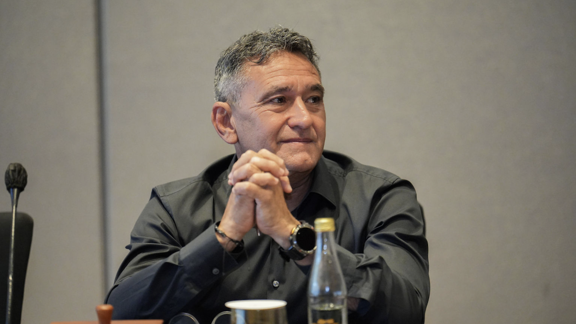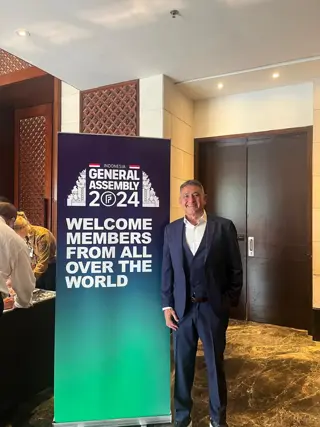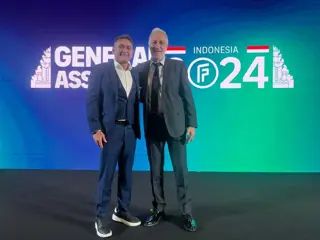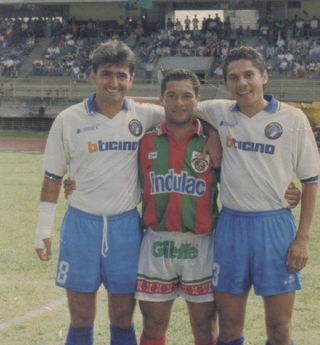News
People of the Union: Jose Ramon Lopez (Venezuela)

People of the Union puts the spotlight on individuals across FIFPRO’s member associations who are dedicated to improving the wellbeing of professional footballers.
Former Venezuela international Jose Ramon Lopez talks about his role as president of the Venezuelan Association of Professional Footballers (AUFPV).
FIFPRO: What is your current role and what is your background?
Jose Ramon Lopez: I am president of AUFPV, currently serving a second term. In 1990, we created the association together with other colleagues, former footballers. I was not on the board of directors because at that time, by-laws did not allow active players to be on it. I took over as president 25 years ago. I have a degree in civil engineering and I set up my own office. Another guy and I worked there, trying to engage with the federation. Then we grew and we joined FIFPRO, first as a candidate member and then as a full member.
Now we have our offices, a foundation to help former players with health problems. We have also created a centre to assist footballers with a gym, dentistry, physiotherapy. It is very small compared to what other associations have, but the devaluation of the currency that Venezuela has suffered is immense and today we have to make a lot of efforts to get around that.
What issue affecting player welfare are you most passionate about?
The one I'm most passionate about is player education and preparing players for life after football. In Venezuela, footballers don't retire with a lot of financial resources; they're not millionaires like in other places. Here, salaries are very low and players have to be prepared. When they retire, they almost always want to be involved in football, which is what they know how to do. And these educational tools that we have through FIFPRO South America have helped us a lot when it comes to educating and equipping our players with new life skills.

What is one of your proudest moments or one of your achievements as a union representative?
When there were the national protests in February 2014, we had a moment when there was football, but there were guarimbas (Ed. note: riots) all over the country. All the streets were closed. So, we proposed to stop playing because the players couldn't get to training. Things were very turbulent. And we made the federation listen to us. They told us that we were allied to the opposition, but we were only concerned about the health of our players, and we called a strike. At first, we thought we couldn’t achieve it because we were in our infancy as a player union, but we did it. The professionals didn't play, and it made us proud to feel that we were starting to represent them well.
And we are about to sign an agreement with the federation on a single contract for footballers, something we have been seeking for five years. It is a type of contract that includes clauses that protect the player in terms of salary, health, etc. We requested them from the federation because today's contracts have some crazy clauses. We have taken a very big step, and we are finalising the details of the agreement.
If you could change something in football, what would it be?
At a local level, that in Venezuela they stop thinking of players as the last link in the chain. At a general level, racism. Everyone is welcome in Venezuela, it's a cultural thing, but it's a serious global problem in football. We should educate people more about the fact that we are all equal.

Is there anyone in the union world or in sports in general who inspires you?
Sergio Marchi. I like how passionate he gets when he defends players. He inspires me because of his attitude, because of what he wants, because of how he fights, because of how he understands that politics is as important as confrontation, because he backs up what he says with facts about what is happening in Argentina. Futbolistas Argentinos Agremiados is very strong.
What is your favourite football memory to date?
Representing my national team as a player is the best thing that has happened to me in football. When you hear the anthem in a full stadium it's exciting, it gives you goosebumps.
Who is your favourite footballer ever and why?
I had the opportunity to face Diego Maradona in the World Cup qualifiers in 1985. I came so close to him and he was a star wherever you looked. Then there is what he represented. Without being directly part of a union, he always used his voice in favour of fellow players.

FIFPRO is celebrating its 60th anniversary in 2025. What does being part of a global union mean to you?
It's very important. We have had many achievements here in terms of the vindication of the player as such, in the sense of their salaries that were not met before, and with the help of FIFPRO we have had the resources to hire specialist lawyers, to have a dedicated team according to what a player needs. I can only be grateful for belonging to FIFPRO because without them this would not be possible. And I would also like to thank FIFPRO South America because we have also become strong in our context.
And looking forward, what do you hope to see unions unite more on to shape the future of football for the players?
I think we have to support each other much more. For example, the unions that have more strength and are more consolidated should, in one way or another, always be hand in hand with those unions who are less experienced. The lived experiences that these unions have always transfer to us and have helped us a lot.
